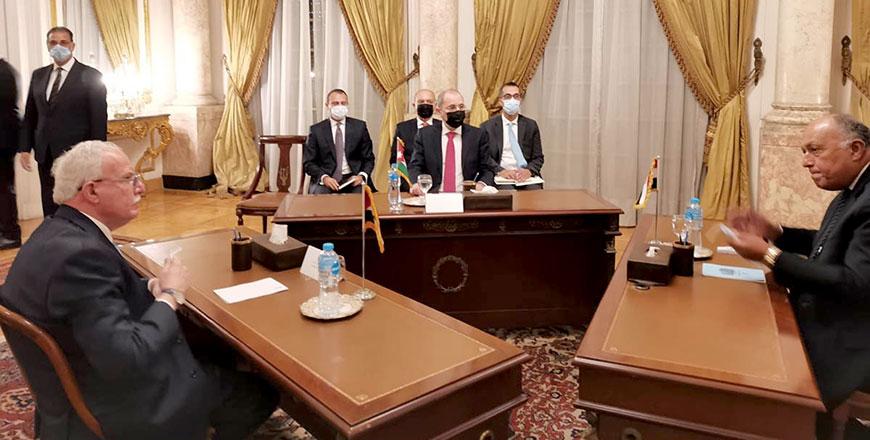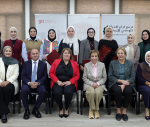You are here
Palestinian cause tops FM’s meetings in Cairo
By JT - Mar 03,2021 - Last updated at Mar 03,2021

Left: Deputy Prime Minister and Foreign Minister Ayman Safadi meets with his Saudi counterpart Prince Faisal Bin Sarhan in Cairo on Wednesday. Right: Safadi meets with Egyptian Foreign Minister Sameh Shoukry and Palestinian Foreign Minister Riyad Al Malki on the sidelines of the Arab League Council meeting at the ministerial level in Cairo on Wednesday (Photos courtesy of Foreign Ministry)
AMMAN — Deputy Prime Minister and Foreign Minister Ayman Safadi on Wednesday met his Egyptian and Palestinian counterparts over the Palestinian cause, according to a Foreign Ministry statement.
The Cairo-based meeting, a continuation of a series of ongoing consultative efforts between the three countries, is aimed at building on the outcomes and decisions of the extraordinary ministerial session of the Arab League Council held at a joint invitation from the Kingdom and Egypt to discuss the Arab situation and support the Palestinian cause.
Talks during the meeting, held on the sidelines of the Arab League Council meeting at the ministerial level in its 155th regular session, went over international and regional and international efforts towards resolving the Palestinian-Israeli conflict on a basis that guarantees the establishment of an independent and sovereign Palestine, with East Jerusalem as the Palestinian capital on the lines of June 4, 1967, in accordance with the two-state solution, international law and Arab Peace Initiative.
The foreign ministers urged the international community to uphold its responsibility and exercise pressure on Israeli side, as an occupation force, to halt its unilateral illegal practices, including the construction and expansion of settlements, confiscation of land and displacement of Palestinians, as well as the ongoing violations at Jerusalem's Islamic and Christian holy sites.
The top officials also highlighted the importance of the Hashemite Custodianship of Jerusalem's holy sites, to preserve the holy city's Arab, Islamic and Christian identity, as well as the legal and historical status quo.
Safadi, Egyptian Foreign Minister Sameh Shoukry and Palestinian Foreign Minister Riyad Al Malki highlighted the need for continuing the efforts of international partners, including the US, towards safeguarding and reviving the peace process in the Middle East, as well as activating the work of the International Quartet, launching serious negotiations on the basis of international law, accredited references and the principle of land-for-peace until reaching an end to the conflict based on the two-state solution.
The top officials also urged the international community to meet their commitments towards supporting UNRWA and rallying financial support to bridge the agency's deficit.
The ministers, at the end of their meeting, reiterated the need for continuing work and sustaining consultations in the next stage to revive “serious and effective” negotiations that would end the current stalemate and enhance the peace process towards a just and comprehensive solution to the Palestinian cause.
The Palestinian cause is the central issue, Safadi said, noting that regional security and stability require achieving fairness for Palestinians and meeting their aspirations, notably right to freedom, the establishment of an independent Palestinian state on the June 4, 1967 lines with East Jerusalem as its capital.
Safadi also stressed that coordination is ongoing between the three countries towards supporting Palestinians and creating a real prospect to resume negotiations aimed at achieving a just and comprehensive peace that fulfils all Palestinians legitimate rights.
Also on sidelines of the session, Safadi met his Saudi counterpart Prince Faisal Bin Sarhan over means to further enhance "brotherly relations" between the two kingdoms.
Safadi and Prince Faisal also reviewed regional and international developments and efforts exerted to enhance joint Arab action in the face of common challenges, according to a separate Foreign Ministry statement.
Talks also covered efforts to re-launch serious and effective negotiations to realise a comprehensive and just peace based on the two-state solution, international legitimacy resolutions and the Arab peace initiative.
They highlighted the importance of ending the Yemeni crisis and addressing tensions in the Gulf region in a way that guarantees regional ties based on non-interference in the affairs of Arab countries, as well as other issues of mutual interest.
Related Articles
AMMAN — Foreign Minister Ayman Safadi on Sunday called on the international community to take effective steps to pressure Israel to halt vio
AMMAN — Deputy Prime Minister and Foreign Minister Ayman Safadi on Tuesday reiterated the necessity of resuming “serious” negotiations towar
AMMAN — Deputy Prime Minister and Minister of Foreign Affairs Ayman Safadi, Egypt’s Foreign Minister Sameh Shoukry and Palestine’s Foreign M

















